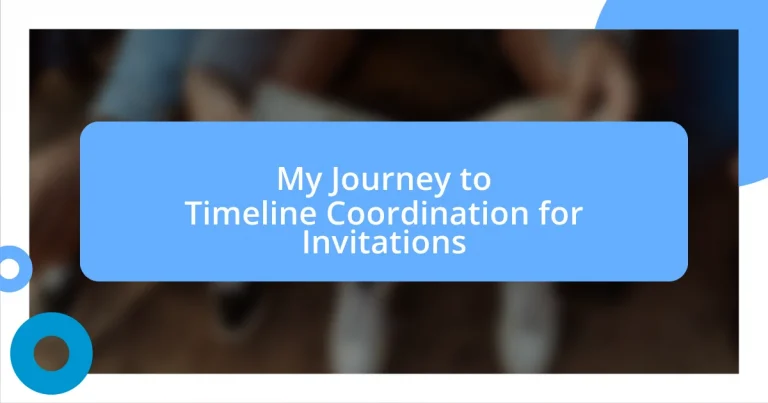Key takeaways:
- Timely invitations are crucial for event success, enhancing attendance and fostering enthusiasm among guests.
- Creating a detailed event timeline involves listing key dates, assigning responsibilities, and remaining flexible to accommodate changes.
- Effective communication, including clarity, active listening, and follow-ups, is essential for smooth coordination and building stronger relationships with guests.
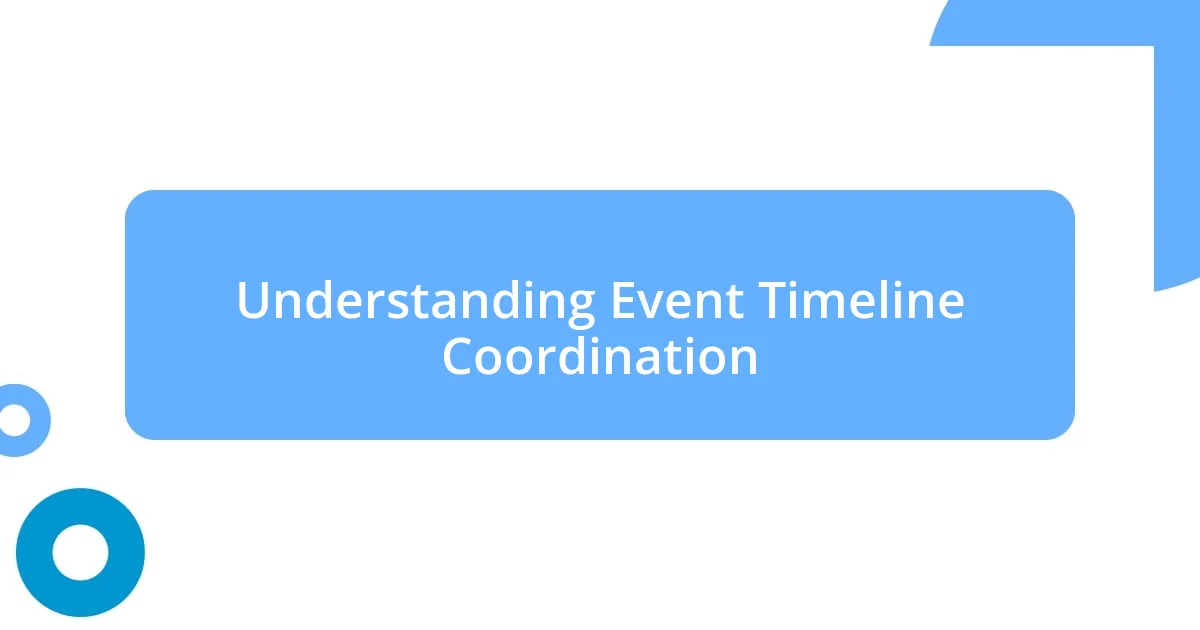
Understanding Event Timeline Coordination
Event timeline coordination is like conducting a symphony. Each component, from sending out invitations to the main event, needs to harmonize perfectly. I remember feeling the pressure of ensuring everything synced perfectly for my sister’s wedding. It was exhilarating yet daunting to map out each minute detail.
When we coordinate an event timeline, it’s essential to anticipate possible hiccups. Have you ever experienced a last-minute change? I certainly have, and those moments can be stressful! However, I’ve learned that flexibility allows for creativity, turning unexpected situations into memorable highlights.
Strategically laying out a timeline doesn’t just help in staying organized; it also enhances communication among all parties involved. I vividly recall how sharing a timeline with my team led to everyone feeling empowered and aligned. This collective clarity helps in minimizing misunderstandings and makes the journey enjoyable for all. Have you considered how a well-coordinated timeline could transform your next event?
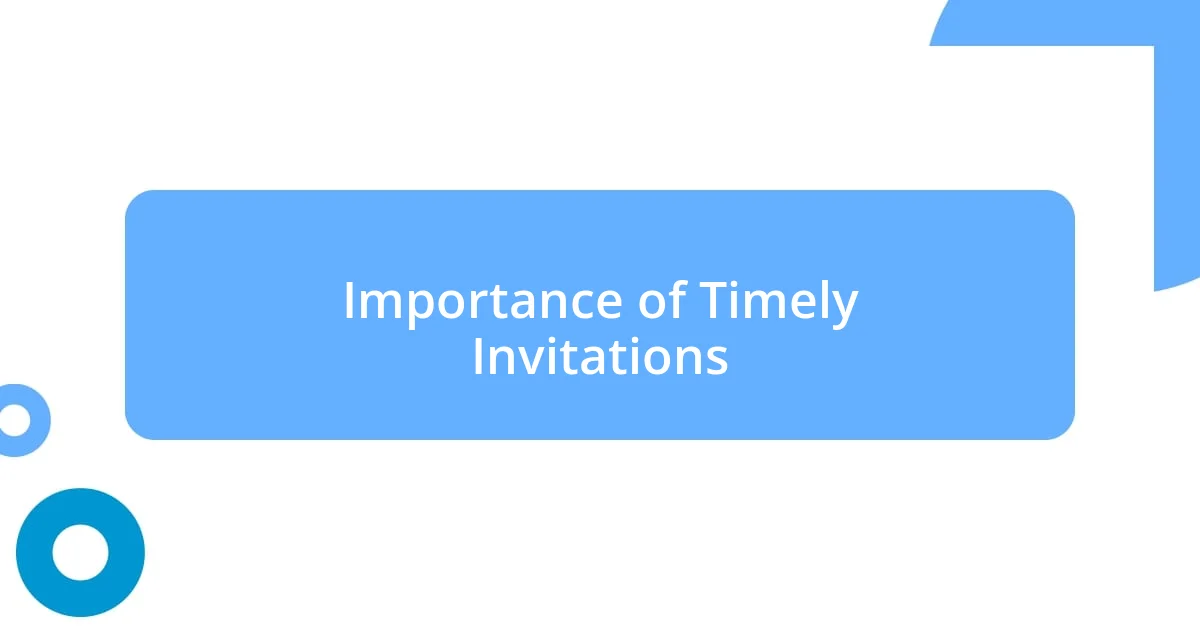
Importance of Timely Invitations
Timely invitations set the tone for any event, acting as the first point of contact between hosts and guests. I recall meticulously planning my best friend’s birthday party and feeling a rush of excitement as I sent out those invites weeks in advance. The responses rolled in and it quickly became evident that giving people ample notice significantly increased attendance. It’s a simple truth: the earlier you invite, the more likely it is that your friends and family can mark their calendars.
Not only do timely invitations signal the importance of the occasion, but they also allow guests to prepare adequately. I once received an invite for a wedding only two weeks prior, and I remember scrambling to adjust my schedule. That experience opened my eyes to how critical it is to provide guests with enough lead time, as it shows respect for their own commitments and establishes a sense of anticipation for the event.
In my experience, timely invitation distribution fosters a more relaxed atmosphere as the event approaches. When people feel prepared, they show up more enthusiastic and engaged. I’ve noticed this trend during family gatherings; those who had ample notice tend to bring thoughtful contributions and arrive with a positive mindset. Overall, timely invitations strengthen relationships and enhance the joy of gathering.
| Timeliness | Impact |
|---|---|
| Early Invitations | Higher Attendance Rate |
| Last-Minute Invitations | Increased Confusion and Low Enthusiasm |
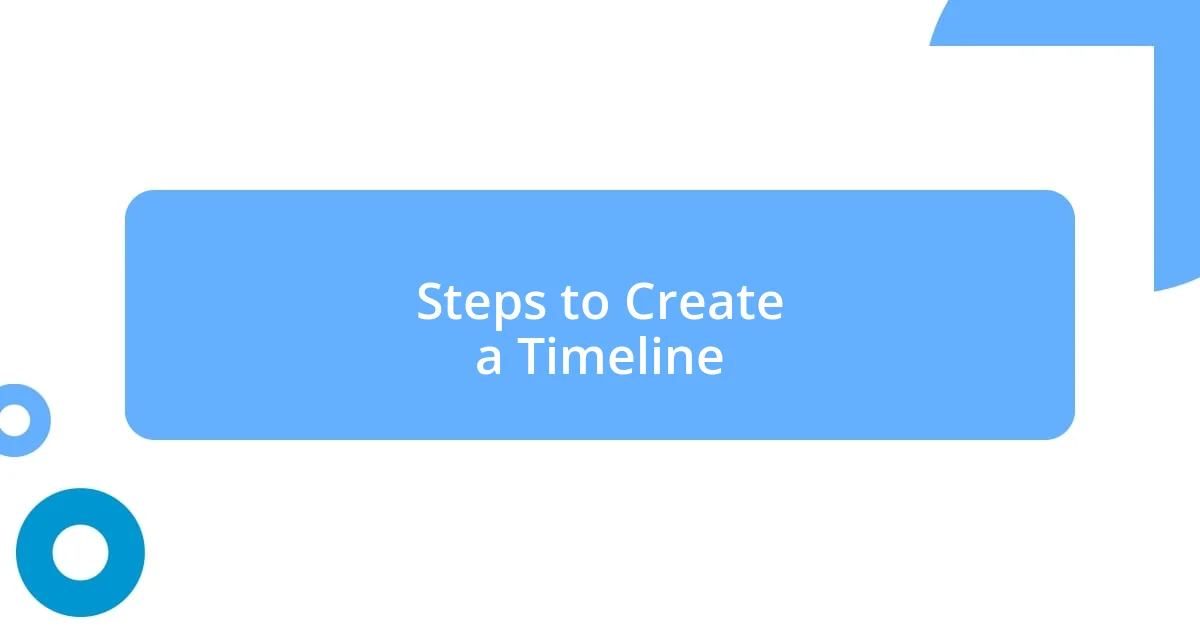
Steps to Create a Timeline
Creating a timeline is an essential step in ensuring your event goes off without a hitch. I’ve found that even a simple approach can lead to impressive results. Start by identifying the major milestones and tasks involved in your event. I vividly remember when I mapped out the timeline for my cousin’s engagement party; it felt surreal to visualize everything step-by-step. This process helped me ensure nothing fell through the cracks.
Here’s how I typically break down the timeline creation:
- List Key Dates: Mark critical milestones like venue booking or invitation sending.
- Assign Responsibilities: Determine who will handle each task to ensure accountability.
- Set Deadlines: Create realistic timelines for each task to keep everyone on track.
- Build Flexibility: Allow wiggle room for unexpected changes or delays.
- Review and Adjust: Regularly revisit the timeline to make updates if necessary.
In preparing for my own milestone birthdays, I’ve learned how crucial it is to incorporate feedback from everyone involved. This not only enriches the timeline but also fosters a sense of collaboration. The process of creating a timeline can be a journey in itself, full of opportunities for laughter and shared memories as you refine details together.
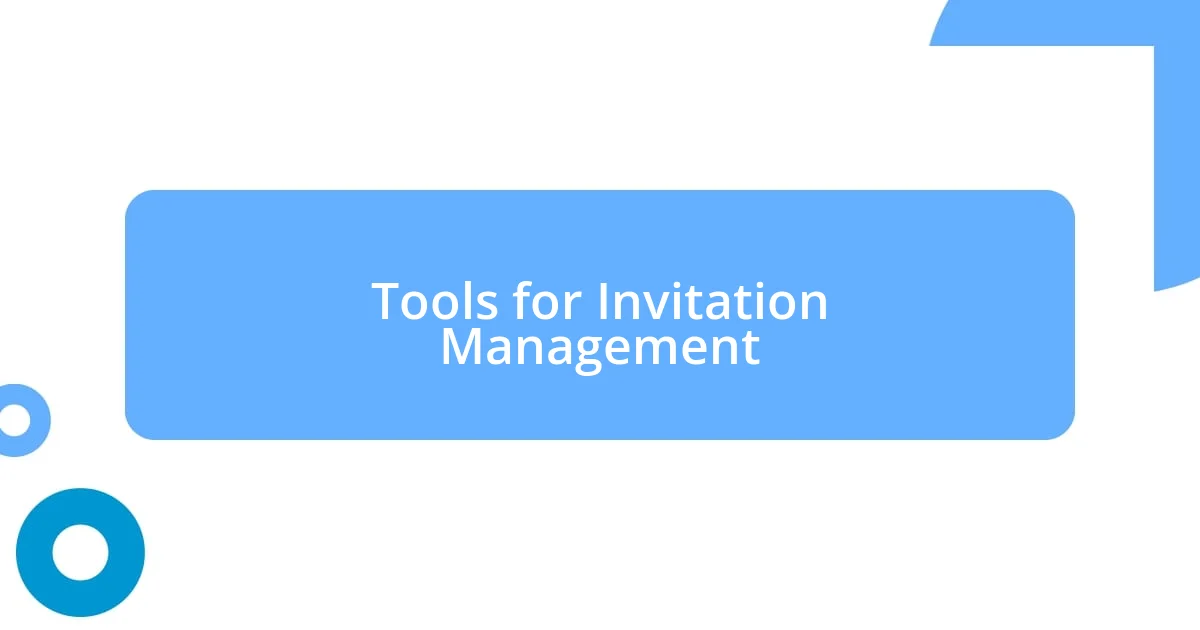
Tools for Invitation Management
When it comes to invitation management, I’ve found that using digital tools can really streamline the process. For instance, platforms like Evite and Paperless Post allow for quick customization of invites and easy tracking of RSVPs. I remember using Evite for a surprise party; the thrill of seeing guests respond in real-time turned the planning into a shared experience, building excitement before the actual event.
Another tool that has become indispensable for me is Google Calendar. It’s not just about marking dates; I often create event reminders which I share with guests, ensuring they don’t forget. I once overlooked an important date, and the panic I felt when I realized it was just days away taught me the value of reminders. They can be a lifesaver, helping both me and my guests stay on top of important details.
I also believe in the power of a well-designed spreadsheet for tracking invitations. It may sound old-fashioned, but I’ve created detailed lists that include each guest’s name, contact information, and RSVP status. This method has saved me countless hours of confusion. One time, in the chaos of planning an outdoor picnic, I realized that a simple spreadsheet had helped me keep tabs on who was bringing what food item. It felt like I was conducting a symphony, ensuring everyone had a role to play and contributing to the harmony of the event.
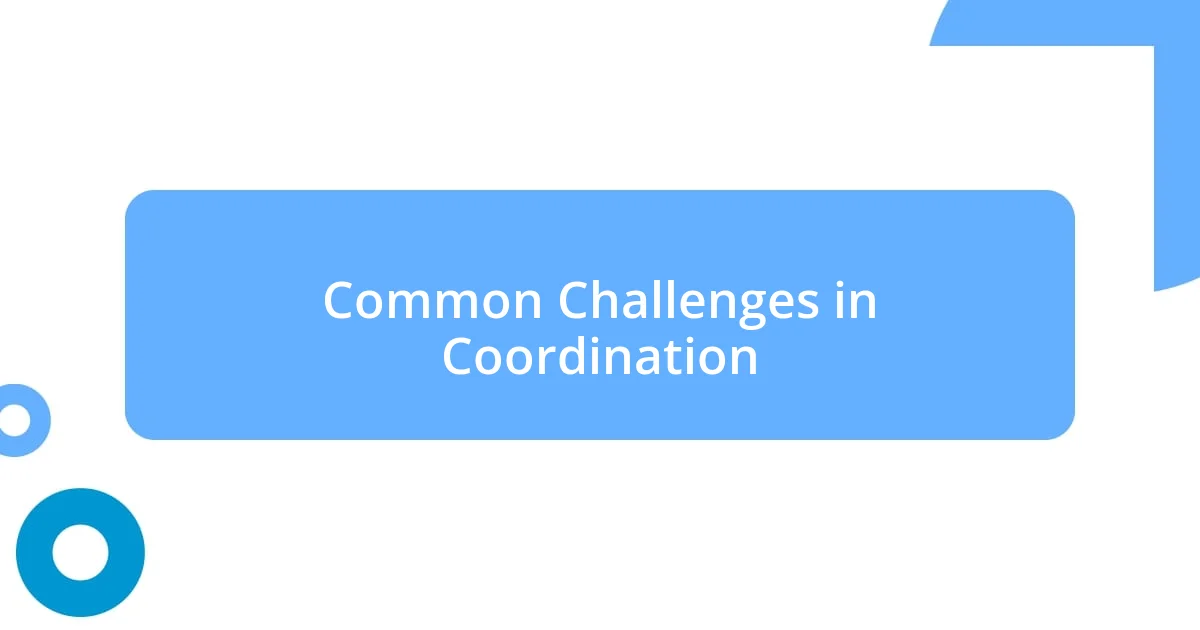
Common Challenges in Coordination
Coordination can be a juggling act, especially when dealing with multiple stakeholders. One common challenge I encountered was aligning everyone’s schedules. I remember planning a group dinner with friends; it was like trying to fit a puzzle together. Trying to coordinate three different schedules led to endless text threads and confusion about who could make it. Have you ever felt that frustration? It can leave you feeling overwhelmed and unsure if it’s even worth the effort.
Another hurdle I’ve faced is managing changing priorities. When planning my sister’s bridal shower, I thought I had everything set in stone, only for her to change her mind about the venue at the last minute. Talk about a curveball! It’s essential to stay adaptable in these situations, but I also learned that clear communication is key. Keeping everyone in the loop makes the process smoother—once I re-sent the timeline, it was as if a cloud lifted, and everyone breathed a sigh of relief.
Deadline pressure is another area where coordination can falter. I remember the crunch of finalizing invites for a milestone birthday celebration; I felt like time was slipping through my fingers. That last-minute rush can lead to mistakes and miscommunication. I found that breaking large tasks into smaller, manageable steps significantly helps. Have you ever noticed how tackling one thing at a time can reduce anxiety? It’s a game changer when it comes to maintaining focus and ensuring nothing gets overlooked.
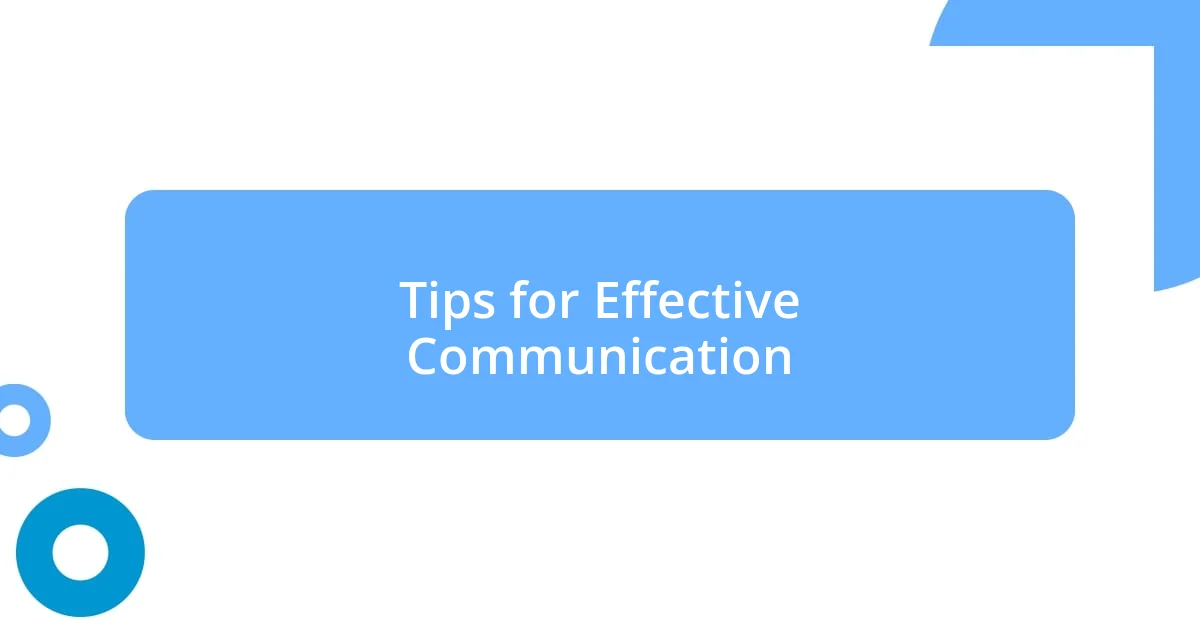
Tips for Effective Communication
Effective communication is at the heart of any successful event planning. I always emphasize the importance of being clear and concise in my messages. Just last month, I was organizing a reunion, and I realized I had to simplify my initial email. Instead of a lengthy paragraph, I bullet-pointed the essential details—date, time, location, and RSVP deadline. This small change made it so much easier for everyone to digest the information quickly. Have you ever noticed how people tend to overlook lengthy emails?
Active listening is another crucial aspect I’ve learned along the way. It’s not just about sending out the details; it’s also about absorbing feedback from the guests. During a discussion for an upcoming dinner party, one friend casually mentioned dietary restrictions I hadn’t considered. That spark of conversation opened up a path to an inclusive menu. I’ve found that when I genuinely listen, it fosters a collaborative spirit among guests that enhances the overall experience. Isn’t it fascinating how a few thoughtful questions can turn a simple invitation into a collective effort?
Lastly, I can’t stress enough the power of follow-ups. After sending out invitations, I always make it a point to check in with guests who haven’t responded. I remember one time sending a gentle reminder to an old college friend—it turned into a delightful catch-up session as we reminisced about the past. That brief outreach not only clarified RSVPs but also rekindled connections. Have you considered how simple follow-ups can greatly enhance relationships while smoothing out any bumps in your planning journey?
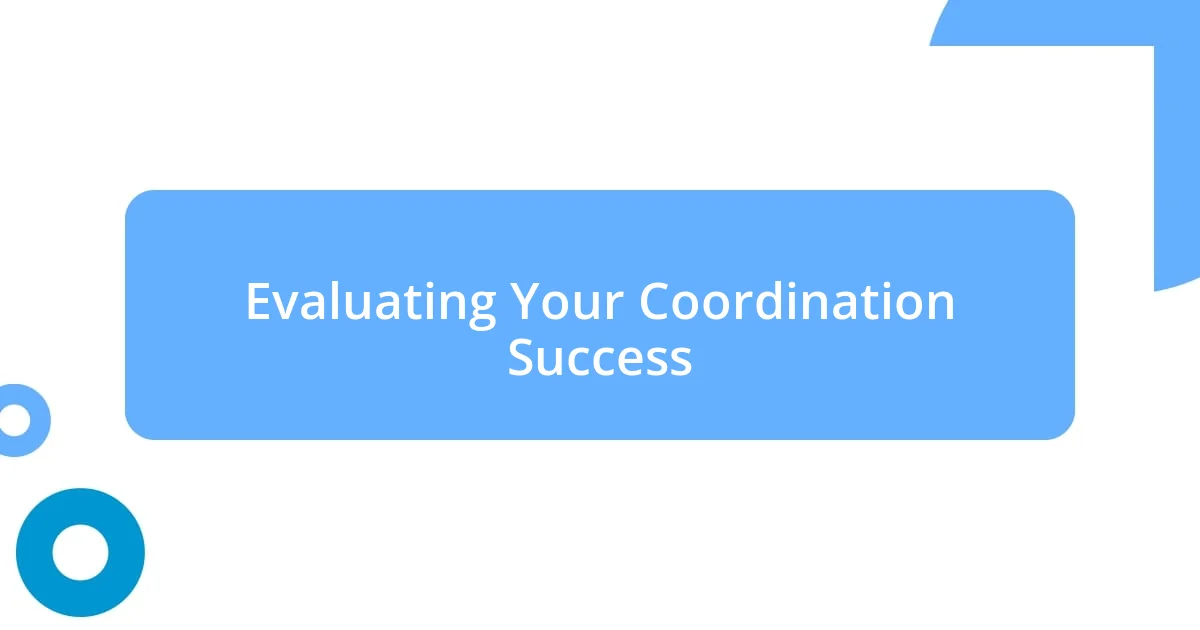
Evaluating Your Coordination Success
Evaluating your coordination success hinges largely on feedback and reflection. After each event, I find it incredibly valuable to gather insights from participants. For example, after organizing a charity fundraiser, I asked attendees what aspects they felt worked well and which could be improved. Their constructive criticism not only made me feel more connected to the community but also provided me with actionable insights for future events. Have you ever paused to reflect on feedback? It can open a treasure trove of ideas.
Another vital element to assess is the timeline adherence. Did everything unfold as planned? After managing a family reunion last summer, I carefully reviewed our original schedule against the actual flow of the day. While we did face a few hiccups, I learned that late starts on activities didn’t significantly impact the overall enjoyment. This realization felt liberating. How often do we get caught up in the need for perfection? Sometimes, a little flexibility leads to unexpected joy.
I also emphasize the importance of tracking emotional responses during the event. How did you and your guests feel throughout the process? I distinctly remember hosting a surprise birthday party where I closely observed the joy on everyone’s faces as the guest of honor walked in. It was a reminder that success isn’t just about logistics; it’s about creating memorable experiences. Have you considered how those emotional moments are a key indicator of your coordination efforts? They often hold more weight than any checklist.












